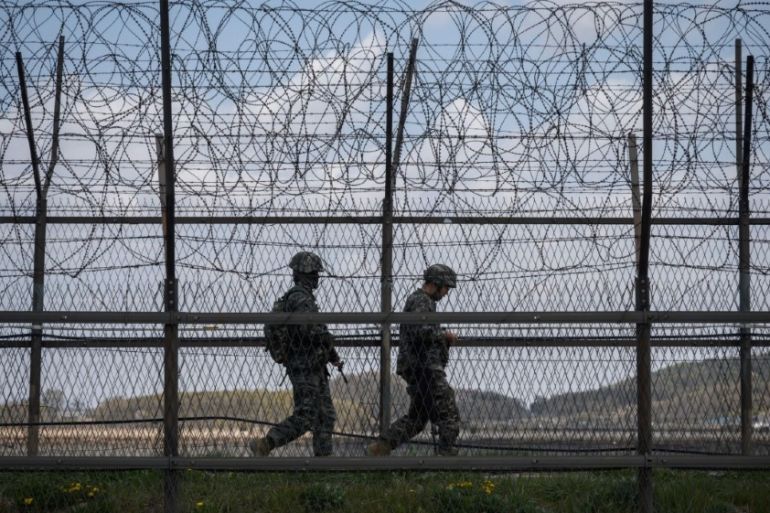Both Koreas violated armistice in DMZ exchange of gunfire: UN
UN Command probe finds breaches by both sides, with the North’s forces firing first and the South’s returning fire.

A United Nations investigation into a recent exchange of gunfire between North Korea and South Korea has determined that both countries violated the armistice that ended the 1950-53 Korean War.
The May 3 gunfire exchange was the first shooting inside the Demilitarized Zone (DMZ) dividing the peninsula in about two and a half years. There were no known casualties on either side.
Keep reading
list of 3 items‘Enemies remain enemies’: N Korea hits out at South, lauds China
Pyongyang facility ‘linked to North Korea’s missile programme’
The DMZ, a de facto border established as a buffer at the end of the Korean War, is officially jointly overseen by North Korea and the US-led UN Command.
The UN Command said in a statement on Tuesday that a multinational special investigation team led the probe with the full cooperation of the South Korean military. It said it invited North Korea to provide information on the incident but the country had not offered a formal response.
The investigation ruled that North Korea breached the armistice by firing four rounds and South Korea by returning fire, according to the statement. It said the probe was unable to determine if the North Korean rounds were fired intentionally or by mistake.
The South Korean defence ministry expressed regret that the UN Command reached the conclusion without investigating North Korea, which Seoul says fired first.
In a statement, the ministry said South Korean troops were reacting in accordance with a response manual and that the South’s military is committed to government goals of promoting peace and easing tensions along the border.
South Korean officials earlier said they fired warning shots towards North Korea after four bullets fired by the North hit one of its front-line guard posts.
The two sides remain technically at war, since fighting in the Korean War ended with an armistice in 1953 that was never replaced with a peace treaty.
The UN Command, which monitors compliance, said the terms of the armistice agreement are in place to minimise the risk of incidents such as gunfire exchanges.
Unlike its name, the DMZ is the world’s most heavily fortified border, guarded by mines, barbed-wire fences and combat troops on both sides.
Gunfire exchanges inside the DMZ are not unusual, but no deadly clashes have occurred in recent years.
The recent incident came amid a deadlock in negotiations between North Korean and US officials on Pyongyang’s nuclear weapons programme. About 28,500 US troops are stationed in South Korea.